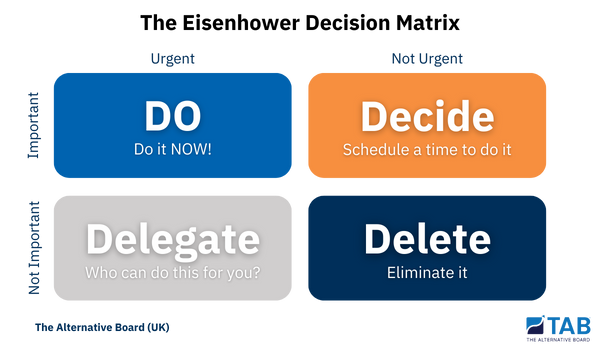
14 Practical Steps to Defeat Stress and Avoid Burnout
by James Ross
Listen to Audio Version:
Are you experiencing feelings of stress and burnout?
One common thing I hear from almost all SME Owners and Leaders is how busy they are and how they are stretched for time.

Unlike roles in large corporates, which tend to be more defined with other departments available for support (such as legal, HR, etc), these issues can often end up on the plate of the CEO of an SME.
While the variety of tasks and challenges can make running a small business fun and rewarding, it can also lead to stress and burnout. A recent report by ZipDo stated that 31% of business owners report experiencing high levels of stress. They also reported that 20% of entrepreneurs work 60 hours or more per week, increasing the risk of burnout, with one in three entrepreneurs struggling with depression and burnout
If this sounds like you, here are 14 practical steps you can take to improve your time management and reduce stress.
Prioritise Tasks
Identify and prioritise tasks based on their importance and urgency. Use tools like the Eisenhower Matrix to categorise tasks into four quadrants: important and urgent, important but not urgent, urgent but not important, and neither important nor urgent.

Set Clear Goals
Define specific, measurable, achievable, relevant, and time-bound (SMART) goals for your SME. This provides a clear direction and helps in allocating time to the most important activities.
Create a Daily Plan
Start each day by creating a to-do list or schedule. Include both short-term and long-term tasks, and allocate time slots for each. Be realistic about what you can accomplish in a day.
Delegate Tasks
Identify tasks that can be delegated to team members or outsourced. Delegating frees up your time to focus on strategic activities while allowing your team to take on more responsibility.
Use Time Management Tools
Utilise time management tools like calendars, task management apps, and project management software to help you organise and track your tasks and deadlines.
Enjoying this so far? Subscribe to our newsletter for more insights like this directly to your inbox
Avoid Multitasking
Multitasking can reduce efficiency and increase stress. Focus on one task at a time to improve productivity and the quality of your work.
Minimise Distractions
Identify common distractions in your work environment and take steps to minimize them. This may include turning off notifications, designating specific times for checking email or social media, and setting boundaries with colleagues.
Time Blocking
Allocate specific time blocks for different types of tasks or projects. This helps you maintain focus and ensures that you allocate sufficient time to important activities.
Learn to Say No
It's essential to be selective about your commitments and tasks. Politely decline tasks or projects that don't align with your priorities and goals.

Review and Reflect
Regularly review your time management strategies and assess what's working and what isn't. Adjust your approach as needed to improve efficiency.
Take Breaks
Schedule regular short breaks during the day to recharge. Taking breaks can actually boost productivity and creativity.
Use the 2-Minute Rule
If a task can be completed in two minutes or less, do it immediately instead of postponing it. This helps prevent small tasks from accumulating.
Measure and Analyse
Use data and analytics to track your time spent on different tasks and projects. This can provide valuable insights into how you allocate your time and where improvements can be made.
Maintain a Work-Life Balance
It's important to ensure that you have a healthy work-life balance. Overworking can lead to burnout and reduced productivity. Set boundaries for when work ends and personal time begins.
 Liam Kane, TAB Facilitator (Northumberland), enjoys some well-deserved time with his family.
Liam Kane, TAB Facilitator (Northumberland), enjoys some well-deserved time with his family.
Join a peer board
Have you heard the phrase 'A problem shared is a problem halved'?
Joining a peer board is a valuable way for business leaders to manage stress and burnout. They provide a safe space to talk to other business owners who understand your challenges and offer accountability, support, and guidance as you develop resilience and coping skills.
If you are a business owner who is struggling with stress and burnout, I encourage you to consider joining a peer board. It can make a big difference in your life and your business's success.
Before the first TAB meeting I was very stressed and felt way outside my comfort zone, but it was wonderful. Everyone was so welcoming and friendly.
- Jolanta Jankowski, Sampson Products Ltd, TAB Member since 2019
...
Effective time management is an ongoing process; it never stops, and it's important to adapt your strategies as your SME grows and evolves. By implementing these tips, you can make better use of your time and increase the efficiency of your business operations.
Related articles

How to handle stress at work as a business owner
Stress in the workplace is a common problem. Here is a strategy of how employers can spot the signs of and deal with work related stress.

The 4 D's of Time Management: Boost Your Productivity and Achieve More
Master time management with the 4 D's strategy: Do, Delegate, Defer, and Delete. Boost productivity, focus, and business success with these effective tips.

Time Management: Theory and Practice
This is a comprehensive guide to time management, its theories and putting them into practice. Learn all about time management with this in-depth post.





